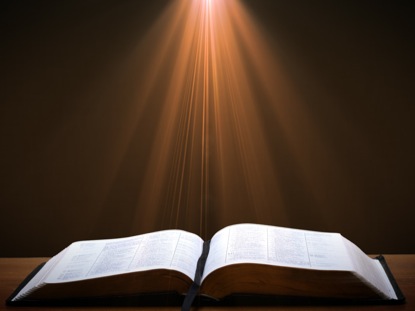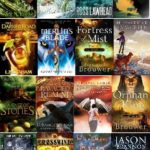The Christian Problem With Magic, Part 2
In the first part of this series, I referenced Deuteronomy 18:9-12 – and who doesn’t when writing about magic and Christianity? But continuing  down the passage (context is king), verses 14 and 15 are just as illuminating to the question:
down the passage (context is king), verses 14 and 15 are just as illuminating to the question:
The nations you will dispossess listen to those who practice sorcery or divination. But as for you, the LORD your God has not permitted you to do so. The LORD your God will raise up for you a prophet like me from among your own brothers. You must listen to him.
The prophet like Moses, as the apostle Peter would declare many centuries later, is Jesus Christ. So what these verses boil down to is, Don’t listen to diviners or sorcerers; listen to Jesus.
In our consideration of Christianity and magic, we need to understand the relentlessly spiritual nature of the “magic arts” God so strongly condemns. The magic arts can be broadly divided into two categories: divination and sorcery. Divination seeks after knowledge, and sorcery after power. In Isaiah, the prophet asks, “When men tell you to consult mediums and spiritists, who whisper and mutter, should not a people inquire of their God?” That is the sin of divination: to turn away from God’s revelation and seek revelation from other spiritual sources – whether by directly consulting spirits or gods or by reading supernatural omens and signs. Examples of divination in the Bible include the witch at Endor, the fortune-teller who was possessed by a demon, and Nebuchadnezzar’s search for an omen. (Ezekiel 21)
If the primary end of divination is to know things, the primary purpose of sorcery, or magic, is to do things. Instances of this, too, can be found in the Bible. The Egyptian magicians replicated the plagues of blood and frogs and turned their staffs into snakes. Simon the sorcerer amazed the people of Samaria with his magic. In Ezekiel 13:20, God declared to certain false prophets, “I am against your magic charms with which you ensnare people like birds and I will tear them from your arms; I will set free the people that you ensnare like birds.” Most impressive of the biblical magicians is Balaam. It was said that those he blessed were blessed, and those he cursed were cursed, and it must have been true, because God told Israel that He had “delivered” them by not letting Balaam put a curse on them.
As with divination, the core of sorcery is engaging the spiritual world – excluding, of course, God, and so leaving only the devil and his. That is why even ineffectual sorcery and divination are dangerous, and why they are so wicked.
We must be careful not to have a superficial understanding of what the Bible means by “magic”. It is not that God hates to see people doing things beyond natural human abilities. Didn’t He, after all, enable His prophets and apostles to perform wonders and signs that had all the magicians and sorcerers beat? But magic, in the Bible, is an attempt to gain illicit power by forbidden spiritual means, it courts spiritual powers other than God, it is done not only in defiance but also rejection of God, and it is, quite literally, anathema – eternally condemned.
But magic, in our culture, is an entirely different animal; people don’t mean by it what the Bible does. Very often “magic”, in popular usage, is anything wonderful or extraordinary; hence you will read cheerful news reports about a politician or movie star or athlete doing his magic. Our society has even given the name magic to sleight-of-hand tricks. In our culture at large, the word magic has become divorced from any supernatural meaning.
 When it comes to magic in fiction, there is no single, all-encompassing definition. Different things are called magic, even within the same work. Magic, in the biblical sense, can and does appear in fantasy, though this is not inherently bad. (What is inherently bad is presenting biblical magic as positive or even neutral – and, I would contend, including real-life occultic practices in such detail as to be Occult 101.)
When it comes to magic in fiction, there is no single, all-encompassing definition. Different things are called magic, even within the same work. Magic, in the biblical sense, can and does appear in fantasy, though this is not inherently bad. (What is inherently bad is presenting biblical magic as positive or even neutral – and, I would contend, including real-life occultic practices in such detail as to be Occult 101.)
But I think that most mainstream fantasy uses magic in the Disney sense. Remember what they said about Elsa’s powers in Frozen, that she was born with them? That is what magic usually is, and it pinpoints the crucial difference between Disney magic and Bible magic. In the Bible, no one is born with magic, because the origin of such powers is always spiritual, never natural. In Disney and many other works, magic is not spiritual; it is an inborn ability, a natural ability. And any natural ability is a God-given ability.
Such fantasy does not imagine a world where it is all right for humans or anyone else to engage spirits and manipulate their power. It imagines a world where humans or whole other races (called variously fairies, elves, wizards, etc.) are born with abilities that would appear in our world supernatural, but which they came by naturally, and so honestly. This is not the magic the Bible condemns; it’s a different thing under the same name.
So when you’re dealing with the Christian problem with magic, the solution is to truly understand magic in the biblical sense and magic in the fantasy sense. Don’t lecture concerned Christians about imagination and culture and Art; that’s like telling someone worried about the chimney catching fire that the fireplace is really a wonderful addition to the room. Some Christians believe, from warnings and stories in the Bible, that the presentation of magic in fantasy is wrong. Starting with the Bible, prove otherwise.











































Not sure most mainstream fantasy uses innate magic; if you read the genre, you’ll find plenty of spiritual magic too. Maybe even Biblical in the sense of getting magic from malevolent spiritual powers. I think they tend more to the pantheistic. Ironically one of the most Christian genres in this sense is classic sword and sorcery-usually the heroes never use magic, and magic is portrayed often as the harmful domain of the villains the hero-barbarian fights.
Elsa is a weird example too, mostly because Frozen is a poorly written movie. In one sense, yeah her powers fall under innate magic. Kind of like a female version of Iceman from the X-men; Elsa as mutant. But her powers soon get ridiculous in what they can do, like the ability to put ice into a person’s heart or mind, or creating sentient beings and instilling them with rationality and souls. That movie played fast and loose with its explanations.
Good points! I used Elsa because Frozen is one of the few times they stopped to explain the source of the magic. Usually, in Disney movies, they just accept it. It really is odd, if you stop to think about it, that Elsa can apparently create life, but they were probably hoping people would just go along with it and have fun. If you want a singing snowman in the movie …
I liked this short series! Good conclusion. This is how I finally acknowledged and enjoyed Harry Potter as acceptable fiction…I realized that my personal dividing line between “inherent” magic and “acquired” magic was not crossed – the magical people in HP were born with their abilities!
Thanks, Bethany.
Thank you for this detailed and thoughtful explanation. This is an area I’ve struggled with as a writer – to show that the “fantastical” elements in my fantasy books are not portraying occult or evil magic. In The Champion Trilogy world that I’ve created, there are only two types of power – the non-natural power brought by evil means, or the power from the Lord – which is spiritual because the power comes from God through a willing believer.
Yes, Christian authors, sensitive to the perils of real-world magic, often define more carefully the magic in their fiction. It’s a good thing.
Well-reasoned, well-researched explanation! I’ve made this same argument, patiently, over and over to a great many people. It’s like the argument that yes, dragons can be good guys, because they’re not all symbols of Satan. (Had that argument, too.)
In my urban fantasy series, everybody is born with one innate power, but there’s elementals running around who can grant you more, in certain circumstances. I love different magic systems, and people come up some awesome stuff. I personally don’t care whether it comes from God or Satan–in fantasy, all I care about is how it affects the hero. (That’s one reason I gave up on Wheel of Time–Rand was screwed because the Source was tainted, and it wasn’t fair.)
I’ve had the argument about dragons, too. Of course, you have to bring up the point that the Bible compares Jesus as well as Satan to a lion; these symbols are versatile.
Glad I found part two, even after all this time. What a great conclusion to this series. It clearly expresses a feeling I’ve had for some time, but didn’t quite to how to explain. Thank you.
Im very tempted by the occult, and this article led me to play a game with “harmless” fantasy magic, and that led me to give in to some of the demonic tempations fantasy gives me(it only happened in my mind, praise God!). That’s probably on me though for not being discerning. Maybe im just weak to the occult and fantasy is bad for me? Maybe im just too weak in my faith? I have very weak faith.